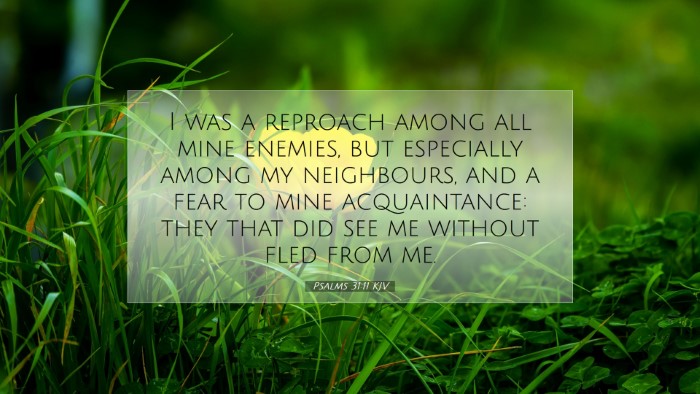Psalms 31:11 Commentary
Verse Context: Psalms 31:11 states, "I was a reproach among all mine enemies, but especially among my neighbors, and a fear to my acquaintance: they that did see me without fled from me." This verse encapsulates a deep sense of isolation and reproach faced by the psalmist, a vivid reflection of the emotional turmoil encountered during times of adversity.
Overview
This verse occurs within a psalm that is laden with themes of trust, deliverance, and heartfelt anguish. The psalmist expresses feelings of being misunderstood and cast off, not just by enemies but also by those close to him. Such sentiments resonate particularly in Christian pastoral care, revealing the human experience of suffering.
Insights from Public Domain Commentaries
Matthew Henry's Commentary
Matthew Henry emphasizes the emotional pain of the psalmist, highlighting that being a reproach signifies being held in contempt and dishonor. The psalmist's neighbors, who should have provided support, instead become sources of shame. Henry notes that the social rejection described here is profound, as it extends even to acquaintances. The flight of those who see the psalmist without is indicative of a greater societal stigma associated with shame and rejection.
Henry further reflects on the implications of this reproach in the context of faith, suggesting that the psalmist's anguish could lead to a deeper reliance on God. He posits that God’s presence can provide comfort amidst such ostracism, and thus, even in moments of deep affliction, the psalmist looks to the Lord for refuge.
Albert Barnes' Notes on the Bible
Albert Barnes provides an analytical perspective on the phrases used in this verse. He points out that the term "reproach" indicates shame and disgrace. The enemies of the psalmist, perhaps from jealousy or malice, exacerbate his suffering by stripping away his honor among peers. Barnes suggests this was not only a physical suffering but also psychological turmoil caused by the weight of public opinion.
Moreover, Barnes interprets the flight of acquaintances—those who might be expected to stand by him—as a sign of the pervasive influence of societal fear. His interpretation draws attention to how fear and disassociation often compound the feelings of a beleaguered individual. This, he argues, offers a powerful message to believers about the nature of sin and its ability to disrupt even the closest relationships.
Adam Clarke's Commentary
Adam Clarke takes a more personal view of the psalmist's lament. He highlights a connection between physical ailment and emotional distress. Clarke interprets the reproach as stemming not only from enemies but also from one's own state of being, creating a cycle of despair that alienates the sufferer from community. He articulates the way that negative perceptions can lead to further isolation in a tight-knit social fabric.
Clarke also discusses the broader theological implications of the psalm: the contrast between how the world perceives the afflicted versus God's view of the believer's worth. He concludes that this psalm encourages believers to recognize their value in God's eyes, even when the world may ridicule or scorn them.
Thematic Reflections
- Isolation and Community: The psalmist's experience serves as a reminder of the way individuals can be affected by communal relationships, the importance of support during personal trials, and the potential for social stigma to alienate.
- Faith Amidst Reproach: Even in the face of significant embarrassment or shame, the verse points to the importance of maintaining faith in God; finding solace and refuge in divine companionship.
- Human Nature and Sin: This scripture invites reflection on how sin can distort relationships and lead to a cycle of shame and despair, not just in the individual but in their surrounding community.
Practical Applications
For pastors and theologians, Psalms 31:11 provides vital material for preaching on compassion and the need for community support for those suffering. The insights from commentaries emphasize empathy and the critical role that the body of Christ should play in addressing the emotional and social needs of those experiencing reproach.
Students and scholars can expand on the notion of communal responsibility in light of the psalmist's experience, exploring how ecclesiastical structures can both contribute to and alleviate feelings of isolation.
Conclusion
Psalms 31:11 captures a poignant reality of human suffering—feeling like a reproach and the resultant fear and isolation from close acquaintances. It is a call for the church to be a refuge, a compassionate body, reflecting God’s grace amidst trials. Understanding this scripture through the lenses provided by esteemed commentators enriches our grasp of both the psalmist's despair and God's ever-present help in times of trouble.


